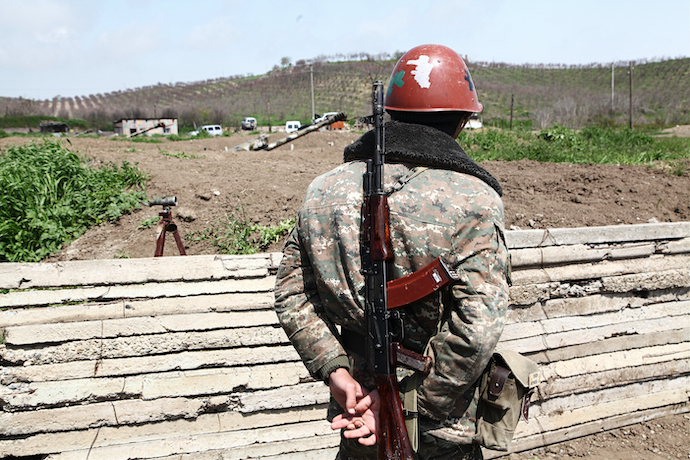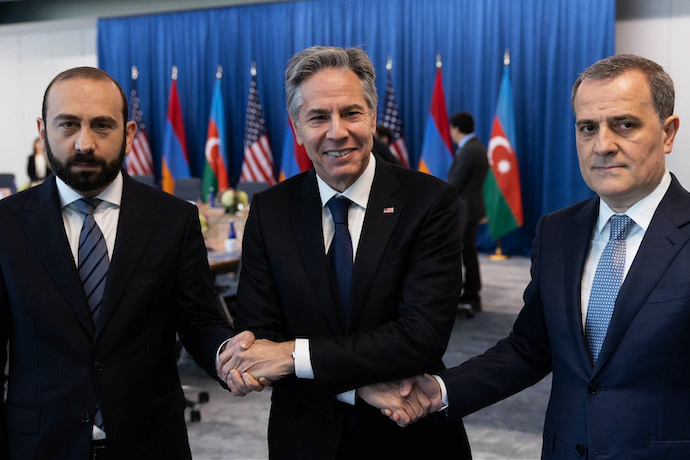
The Erosion of U.S. Influence in the South Caucasus
The Biden administration’s pursuit of a mediating role in the South Caucasus has been met with unforeseen challenges. This setback is illustrated by the stalling of a pivotal meeting that was supposed to occur earlier this year, aimed at bringing together the foreign ministers of Armenia and Azerbaijan.
Washington’s diplomatic relations with Azerbaijan have been adversely affected by a report by the United States Commission on International Religious Freedom (USCIRF). The report led to the USCIRF’s recommendation for Azerbaijan to be placed on the U.S. State Department’s Special Watch List due to perceived breaches of religious freedom. Concerns have been raised regarding the involvement of Danielle Saroyan Ashbahian, a former Armenian lobbyist, in the report’s preparation.
The assertions within the report concerning at-risk Armenian religious sites in Azerbaijan have been met with skepticism due to a dearth of supporting evidence. Critics have decried the report as being marred by political bias, manifesting an implicit disapproval of Azerbaijan’s reassertion of control over territories once governed by Armenia. Despite Ambassador Robert C. O’Brien’s diplomatic overture to Baku, marked by a visit aimed at reconciliation and his engaging presence on social media, the U.S. State Department’s move to add Azerbaijan to the Special Watch List has undeniably escalated tensions. This development occurs at a pivotal moment, with Washington seemingly shifting from its previously adversarial approach toward Azerbaijan to one of engagement, actively endeavoring to broker dialogue between Armenia and Azerbaijan.
These developments come on the heels of the 2023 terror incident at Azerbaijan’s embassy in Tehran and the targeted attack on Fazil Mustafa, a member of the Azerbaijani parliament and outspoken critic of Iran, in Baku. Arrests have been made with credible evidence linking some Shia extremists to Iranian operations.

As the Biden administration navigates the complex dynamics of the South Caucasus, its diplomatic strategy has faced criticism for failing to adapt to the evolving geopolitical landscape post-2020. Azerbaijan’s recapture of territories has dramatically shifted the balance, challenging long-standing frameworks like the Minsk Group, co-chaired by the U.S., France, and Russia, which previously sought to maintain the status quo.
Despite these changes, U.S. policy discourse seemed anchored in the past, with Karen Donfried, formerly Assistant Secretary of State for European and Eurasian Affairs, and senior State Department adviser on the Caucasus, Philip T. Reeker, using terms that no longer reflected the new balance of power. This approach overlooked Azerbaijan’s clear stance on its territorial sovereignty and the integration of the Karabakh region’s Armenian minority under Azerbaijani governance. The persistence of outdated terms such as “status” and reliance on a defunct Minsk Group mediation signaled a disconnect from the region’s reality, especially as global attention was drawn to Russia’s invasion of Ukraine.
Statements by Lynne M. Tracy, the former United States ambassador to Armenia, suggested that the so-called status issue and conflict in Karabakh is not resolved, and the comparative silence from the U.S. embassy in Azerbaijan, sent mixed signals. These actions were perceived as undermining Washington’s role as an impartial mediator, possibly emboldening Armenian nationalist aspirations rather than fostering a pathway to peace.
In an attempt to pivot from the Minsk Group’s approach without altering its essence, the U.S. substituted the contentious term “status” with “rights and security of the Karabakh Armenians,” proposing an “international mechanism” for protection. However, Azerbaijan maintained its position that the Armenian minority should be integrated into its society with guaranteed rights under Azerbaijani law and international agreements concerning ethnic minorities.
The U.S. refrained from pressuring Armenia to comply with the joint trilateral statement to withdraw its troops from Karabakh, a key point that Azerbaijan insisted upon as part of the peace process. This lack of action has been interpreted as tacit tolerance of the status quo, contributing to the deadlock.
Additionally, the U.S. State Department’s focus on the unregulated use of the Lachin corridor by Armenians, as advocated by U.S. Secretary of State Antony Blinken, has been criticized as an infringement on Azerbaijan’s sovereignty. This stance has further complicated Washington’s position as a credible mediator, appearing to prioritize one side’s interests over the other’s sovereign rights, thus complicating an already delicate diplomatic undertaking.
The trajectory of the U.S. role in the South Caucasus took a contentious turn following Azerbaijan’s large-scale military operation to reclaim Karabakh in September of last year. Secretary Blinken faced criticism for his response to the actions of Azerbaijan, which sought to reinforce its sovereignty over Karabakh. His reluctance to affirm Azerbaijan’s territorial integrity at a news conference further complicated matters, especially in light of the U.S. embassy’s hesitation to engage with the Azerbaijani city of Shusha. This reticence was noted by Azerbaijani society and contrasted starkly with Armenian Prime Minister Nikol Pashinyan’s acknowledgment of Azerbaijani sovereignty.

The narrative worsened when James O’Brien, Assistant Secretary for European and Eurasian Affairs, indicated to U.S. lawmakers the postponement of high-level visits to Azerbaijan, raising questions about Washington’s respect for Azerbaijan’s sovereign rights. Secretary Blinken’s subsequent efforts to mend fences through a phone call with President Ilham Aliyev highlighted the delicate diplomatic dance, with Aliyev asserting Azerbaijan’s pre-conditions for re-engagement.
The broader regional strategy of the United States has been called into question, with critiques pointing to an Armenia-centric approach that overlooks Azerbaijan’s strategic significance. Azerbaijan’s geopolitical positioning as a gateway to Central Asia, its proximity to U.S. adversaries, its role in curbing Iranian influence, its partnership with NATO ally Turkey, its significance in European energy security, its strategic ties with Israel, and its function in the Middle Corridor are crucial elements that are undervalued by Washington.
Furthermore, Washington’s perception of the South Caucasus as an ancillary battleground related to the conflict in Ukraine has been challenged. Despite the interdependencies between Armenia and Russia, the Biden administration’s policies are perceived as disproportionately pressuring Azerbaijan and Turkey in an unrealistic bid to dislodge Russian influence in the region.
This complex situation was further tangled by reports of a covert meeting involving U.S. and EU representatives, where they supposedly lobbied Russia to intervene in Azerbaijan’s sovereign affairs, a move that would potentially undermine Azerbaijan’s territorial claims and security efforts. The overall picture painted is one where U.S. diplomacy appears misaligned with the regional dynamics and realities, necessitating a reevaluation of its strategic approach in the South Caucasus.
The Zangezur corridor has emerged as a pivotal factor in the South Caucasus’s regional peace architecture. Past attempts by the U.S., particularly, efforts by the U.S. State Department in 2009 to broker open borders between Turkey and Armenia via the Zurich Protocols, faltered by not adequately considering Azerbaijan’s strategic interests and regional stance. Despite significant U.S. pressure, Turkey’s steadfastness in linking border openings to the resolution of Azerbaijani territories reflects a nuanced understanding of regional dynamics—a perspective the current Biden administration seems to struggle with.
Advisors from the Obama era, now guiding President Biden and Secretary Blinken, confront a markedly changed geopolitical landscape in the South Caucasus. The reclamation of territories by Azerbaijan, coupled with Turkey’s more pronounced stance within NATO, underscores the imperative for the United States to refine its strategy. This recalibration must take into account the contingent dynamics of Turkish-Armenian relations and acknowledge the strategic importance of opening the Zangezur corridor. This corridor is not merely a passage; it is a crucial artery that connects mainland Azerbaijan to the Nakhchivan Autonomous Republic, underlining its significance for regional connectivity and stability.
The insistence of Turkish President Recep Tayyip Erdoğan on Azerbaijan’s endorsement of Turkish-Armenian rapprochement underscores the interlinked fate of regional peace processes. Armenia’s hesitation and delayed commitments exacerbate regional tension, while U.S. policy appears to misapprehend the strategic role of the Zangezur corridor. There is a paradox in U.S. strategy: it supports Armenia’s sovereignty yet overlooks the control that Russian border guards exert over Armenia, including along the Zangezur corridor’s proposed route.
Washington’s apparent geopolitical maneuvering, aiming to undermine Russia’s influence as part of its broader stance on Ukraine, risks destabilizing the South Caucasus. This approach may ultimately hinder Armenia’s economic integration and prosperity. U.S. policy must pivot towards encouraging Armenia to fulfill its obligations, fostering regional stability, and economic development through the Zangezur corridor.
As Ambassador Mark W. Libby embarks on his tenure in Baku, the opportunity arises for the U.S. to restore faith in its diplomatic role. By affirming support for Azerbaijan’s territorial integrity and advocating for the rights of displaced Azerbaijani minorities from Armenia, the U.S. can realign its position as an impartial mediator. Additionally, unequivocal U.S. endorsements of Azerbaijan’s sovereignty, akin to those afforded to Georgia, Ukraine, Moldova—and ironically Armenia—would signal a genuine commitment to regional equity.
The U.S. must navigate away from propagating unfounded fears of Azerbaijani aggression and prioritize its national interests over external lobbying influences. Addressing the constraints imposed by Section 907 and exploring defense trade opportunities with Azerbaijan could serve as strategic levers to bolster Azerbaijan’s stance against regional adversaries and international terrorism. Such steps would not only enhance Washington’s strategic presence in the South Caucasus but also mark a significant improvement in U.S.-Azerbaijani relations, fostering a collaborative environment for addressing mutual concerns.
